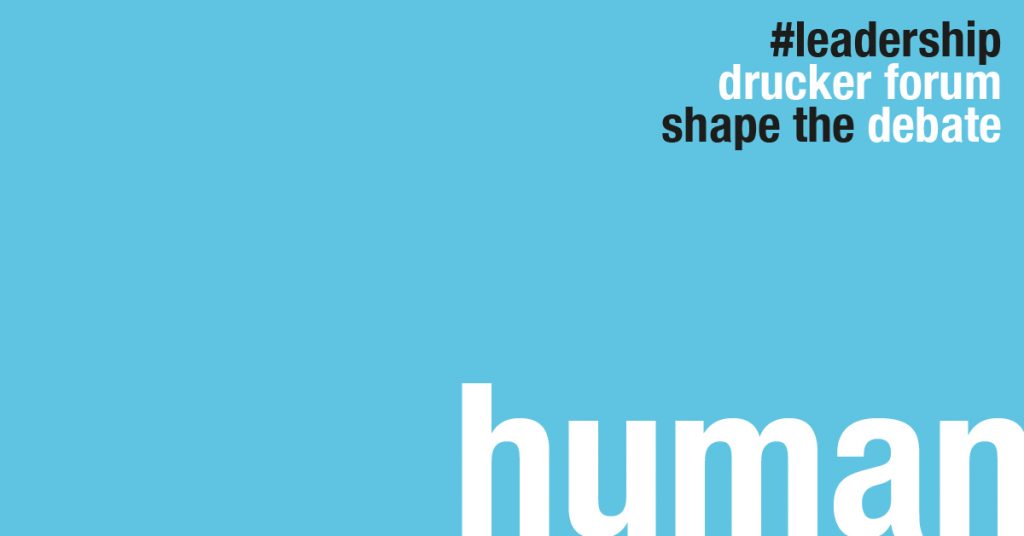
Welcome to the Drucker Forum 2020, with a theme this year of “leadership everywhere.”
It is a theme we chose a year ago, before anyone could know the challenges that 2020 would bring. As it turned out, this year cast a bright spotlight on the performance of leaders everywhere – and the light has not always been flattering.
Drucker Forum 2020
We all know that the quality of leadership matters in a crisis, but I think we tend to think of that as a set of reactive skills – as in, leaders who can respond quickly to terrible events and make sense of chaos. Just as important is to think of the proactive challenge – having a good leadership system in place well in advance of a crisis so that an organization or a society can weather the storm when it hits. We have all learned in this year of pandemic how the people who are at greatest risk are those with preexisting conditions. The same is true for organizations and societies: many of the worst hit had chronic issues limiting them – and I would suggest that the most debilitating preexisting condition for some has been their leadership deficiency.
Perhaps the most striking lesson about leadership we can take away from this year is that leaders have an enormous responsibility to understand when tradeoffs have to be made between conflicting priorities. This was the point of an article that Roger Martin, Julia Kirby, and I published recently with Harvard Business Review. Perhaps you have seen it. We urged developing leaders not to make the mistake of relying on technocratic methods when the decisions they face are really about what weights to place on competing values.
Another big leadership lesson of 2020 has been that finding a path to an acceptable balance requires not only wisdom but courage. Courage is not waiting to see how things trend on social media, and caving in to the most strident constituencies – and neither is that leadership. It is, at best following, and possibly following in a very wrong direction.
And finally, even a smart and courageous leader can fall short if he or she doesn’t have legitimacy. This year’s reminder of that came from the policymakers and executives who talked the most about how they would do nothing but “follow the science.” Only leaders who have failed to earn the trust of their people have to rely so heavily on the borrowed authority of experts.
All this is true in business, as well. Data give us fragments of reality, but sound human judgement remains indispensable. In complex situations, it is folly to rely on one single domain of expertise to determine the way forward. Great leaders are great synthesizers, able to call on multiple perspectives, including history and philosophy. Education and culture matter.
When I asked Doris Drucker 10 years ago what was most important to Peter, her answer was clear: it was the human being, not as a slogan but in all its complex reality. Of course, humans are toolmakers, and we want technologies, including in digital form, to make important contributions by making work easier and filling human needs. But to create and support a functioning society, leaders can’t center their attention on technology development and adoption. They must be first and foremost devoted to realizing human potential, and always working to deepen their human understanding and connections.
It’s no accident that concerns like these were central to the work of two distinguished management thinkers to whom, with a heavy heart, we say goodbye this year. One is our friend and mentor Clay Christensen. If you have been to past Forums you may have met him or heard him speak. Please try to take part in the special tribute to his ideas and impact that we have included on the program. The other lost friend is Joseph Maciarello, Peter Drucker’s closest collaborator at Claremont and perhaps the nearest thing he had to an academic successor. Joe’s focus was on management as liberal art, and he worked tirelessly until the end to bring this founding concept to life for students and managers.
I am the first to admit that a virtual format cannot replicate the richness of the conversation and connections with old and new friends that have always been central to the Drucker Forums in Vienna. But in a very Druckerian way, we have risen to the challenge of weaving together threads of change and continuity. Our digital team has been phenomenal in their efforts to ensure that our online experience will be well ordered and satisfying. You will find new ways to engage with content, speakers and with fellow conference participants. And certainly you will find much content to choose from: we are proud that the 2020 program features the richest menu of options we have ever offered and a truly unprecedented slate of thinkers, practitioners, and moderators. In fact, there is no way you could experience it all in the space of a few days, so we are making replays of all sessions available to conference participants.
As for that usual great benefit of conference attendance—professional networking—we have thought of that, too. Please make use of our networking lounge both for side conversations you decide to arrange and for spontaneous chats, just as you would in Vienna. It is open throughout the event.
I think all of us together will learn a fair bit about how best to engage with and enjoy and online Drucker Forum. Without doubt, we will learn a lot about leadership. I wish all of us a rewarding experience.
Richard Straub
Founder and President
Global Peter Drucker Forum
This article is one in the “shape the debate” series relating to the fully digital 12th Global Peter Drucker Forum, under the theme “Leadership Everywhere” on October 28, 29 & 30, 2020.
#DruckerForum


This probably the best, and the most fantastic post i have ever seen, can’t wait to dig deep inside your other blogs.